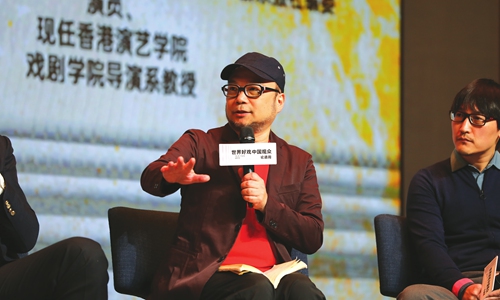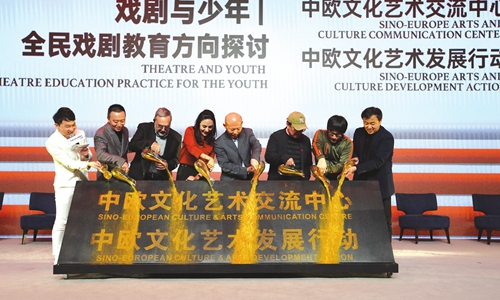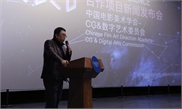
Roy Szeto Photo: Courtesy of He Ming
Even though Deling and Cixi, a Chinese stage drama about the Qing Dynasty (1644-1911) princess Der Ling and Empress Dowager Cixi, originally debuted more than 20 years ago, the good word-of-mouth around the recent restaging of the classic work has shoved theater director Roy Szeto into the limelight.
"This is part of my recent efforts to return to the origins of xiqu (traditional Chinese opera)," Szeto, a renowned Hong Kong theater director, told the Global Times on Friday at the World Class Theater for Chinese Audiences Forum.
"I am training these actors in the ways of xiqu, which in my mind are the best ways for Chinese when it comes to the performing arts. In the past, I always felt that something was missing while directing Western dramas. Later, I tried using our own ways and then things became different. We are so different than Westerners. We know how to look past our own bodies and feel other people," Szeto said.
Healthy interactions
Szeto has not only made a name for himself with his decades of experience in the theater industry, but also won applause in the film industry. After graduating from the Hong Kong Academy for the Performing Arts in the 1990s, he began working at director Hark Tsui's film studio, which he says was a valuable experience.
"I learned a lot there and started to understand what creativity is," said Szeto.
Szeto said he was fortunate to be in the film industry during the golden age of Hong Kong cinema.
"It was impossible to make a living with theater plays at the time. So I had to support this hobby with what I earned making movies," Szeto noted.
In 1997, things started to change for him after he directed singer Jacky Cheung's musical Snow Wolf Lake, which turned out to be a huge success.
"It changed the market's view toward stage plays. I was now able to become a full-time theater director," Szeto said proudly.
Many of his later works, such as Dear, Hu Xueyan, staged by the Hong Kong Repertory Theatre, toured Hong Kong and mainland cities, where they received high praise from audiences. None of these dramas have lower than an 8/10 on Chinese media review site Douban.
"For each work, I would challenge myself to make it a living thing," he said.
"The relationship between the audiences and us is not just that of consumers and product makers. There is a healthy interaction between us."
Szeto noted that although a lot of cultural exchanges have taken place between mainland cities and Hong Kong, more work still needs to be done.
"We need to act quick to do something for young Hong Kong people. If they can come to visit the mainland themselves, they will find changes and outstanding things in some areas here. If more theater exchanges can happen, we can help young Hong Kong people get to know what the world they are living in looks like," he said.
As more Hong Kong plays are being staged in the mainland, Szeto said he is happy to see some changes and acknowledgement.
"Once a mainland audience member asked me a question about why the performers spoke Cantonese on the stage instead of Putonghua [standard Chinese]. But over the past three years, they have accepted that and the way we do theater works," he added.

Chinese and European theater artists launch a cultural exchange program as part of the World Class Theater for Chinese Audiences Forum held in Beijing on Friday. Photo: Courtesy of He Ming
International cooperation
At the World Class Theater for Chinese Audiences Forum hosted by Magnificent Culture, Szeto and other overseas theater directors and actors including Jean Varela, Florence March, Philippe Martz, and Oriol Broggi, attended a series of talks about theater education, creation and variety.
How to attract young audiences into theaters has been an international problem facing theater directors and managers for many years. French director Eric Lacascade told the Global Times that the root of this problem lies in society and that young people need to be encouraged to watch plays with friends instead of locking themselves in their rooms with games and cellphones.
He also talked about his upcoming collaboration with Magnificent Culture to put on a performance of Chinese theater master Cao Yu's Thunderstorm.
"I am really enjoying the show, a wonderful cultural journey. It is more like a chemical experiment with different ingredients, including China's traditions, added to it. And I am anticipating the final result of such a chemical reaction," Lacascade said.



